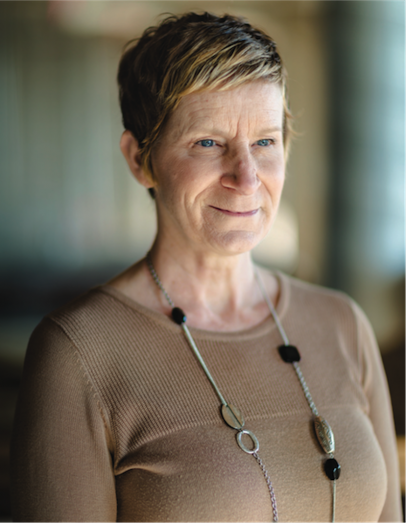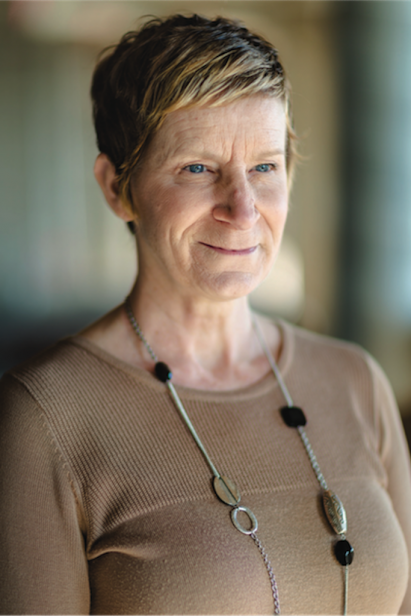Ladies Who Launch
Shelley Jurewicz and Tera Johnson have a lot in common— both can trace their passion for food back to Wisconsin farms. They took that passion off the farm onto the factory floor, into the boardroom and all the way to the bank.
Now they’re working to help others do the same. And the best part? They’re doing it right here at home.
Jurewicz grew up in a farming family in Jefferson, Wis.
“My grandfather’s farm produced Schiferl Snow Fairy Popcorn. Every morning we took our steel containers to milk the cows but I never thought I’d be in the family business,” she recalled. Jurewicz started her career in Jefferson’s first fast food restaurant. “I flipped burgers at Hardee’s all through high school.”
After earning a degree in food science from the University of Wisconsin - River Falls, Jurewicz did an internship at Stoppenbach Meats, which led to a job after graduation.
“I was a quality assurance coordinator. I walked the plant floor and did product testing,” she said.
Jurewicz eventually landed a position at the Metropolitan Milwaukee Association of Commerce (MMAC) where she created and ran Fuel Milwaukee, the initiative to attract and retain young professionals. When a statewide research project revealed that food and beverage manufacturing was one of the region’s strengths and offered economic growth potential, Jurewicz was excited about the findings and among the first to act.
Her food background made her the perfect choice to develop a food and beverage cluster organization.
“In Wisconsin, we have strengths in beer, brats and cheese, but we also have strengths in spices and seasonings and in packaging and equipment making…the goal of the cluster organization was to take those strengths to another whole level,” Jurewicz said. The first step was getting the right players together and Jurewicz wasn’t shy about reaching out.
“We had our first meeting in January, 2012, with 90 CEOs in the Historic Miller Caves,” she said. That marked the birth of a FaBulous organization…pun intended.
“We went about it strategically, I had a core group of businesses including Miller Coors and Palermo’s…we asked each of them to bring five people,” she said. The food and beverage cluster organization — FaB Milwaukee — later became FaB Wisconsin.
The group now includes KHS USA Inc., a Waukesha-based food and beverage packaging manufacturer; Birds Eye foods and Chr. Hansen, Inc., a food enzyme company and a slew of other impressive names.
FaB’s mission is to help grow the food and beverage industry from farm to factory to fork. With Jurewicz at the helm, FaB’s current programs and initiatives include promoting food safety, fostering talent development and helping local companies grow and fund their businesses.
The biggest project on Jurewicz’s plate is The Future Food Center at FaB Square. With two square blocks near W. 27th and Wells Streets, the center will house offices, processing space, a laboratory, demo kitchen, galleria and rooftop farm.
“The center will shine a spotlight on the food manufacturing industry,” Jurewicz said, “It will be as important for food and beverage manufacturing as it is to the foodie.”
Like Jurewicz, Tera Johnson’s experiences around farming fueled her early passion.
“My dad lived in Hartford and I spent summers surrounded by farming,” Johnson said. But New York is where she learned about food.
“There’s a more diverse and progressive attitude about taste and flavors there. I’m an ideal hybrid,” Johnson said. She entered the food world armed with a graduate degree in agricultural economics from the University of Wisconsin-Madison.
“My goal was to feed the world and in Madison’s (now defunct) agribusiness center, the idea was to help diversify Wisconsin’s cheese industry,” Johnson said.
Wisconsin was the perfect setting for that diversification in both quality and process.
“At that time, Wisconsin cheese meant cheddar with red wax…now we make some 4,000 cheeses,” Johnson said. “It takes a lot of infrastructure. You need farmers, factories, trucks. Wisconsin benefits from having all of those things in place.”
Johnson eventually became CEO of White Clover Dairy which produced organic cheese.
“None of the organic cheese makers had a place to send whey. You pay a lot of money for organic milk and you end up with this by-product. It was a challenge to add value to the organic whey,” Johnson said. Intrigued by that challenge, Johnson planned her next career move.
“I was too young to retire. I decided to become the crazy person and raise money to build an organic whey factory,” she said. “People think the cheese industry is an old, quaint, backward thing, but it’s a big global industry and it has a tremendous amount of innovation.”
That innovation led to the creation of Tera’s Whey. But Johnson didn’t stop there, she raised the money to build a plant.
“There was this sheer magnitude of the money combined with the complexity of the design. The factory had 14 miles of stainless steel pipes. It won a lot of green design awards. The organic consumer cares about how you manufacture things, so this plant was incredibly energy efficient.”
To paraphrase “Field of Dreams,” Johnson built it and customers came, but temporarily.
“In 2008, two months after building the plant, the economy fell apart and customers were suddenly pulling out. It was utter panic on my part,” she recalled. That panic led to action.
Johnson asked herself — What customers are ready to take organic whey tomorrow?
“The answer was infant formula companies. That’s how it all started,” Johnson said. Tera’s Whey soon moved from baby bottles to become the number one brand in the natural protein powder category. Johnson eventually sold the company but her namesake organic protein still brings accolades.
“People are always telling me stories like ‘my mother had cancer and her doctor recommended your product, it changed her life.’ I’m proud to have created a category for organic whey protein. Plus it’s delicious, I drink it in my smoothie every morning,” Johnson said.
After running a company and revolutionizing the powdered protein industry, Johnson was just hitting her stride.
“After we sold Tera’s Whey, I was still too young to retire but pushing the boulder up the mountain was not what I wanted to do anymore. I still love the entrepreneurial stuff and I had learned more about money than I ever cared to.”
Johnson, a self-proclaimed “serial entrepreneur” decided to create the Food Finance Institute, (FFI) where she consults with food entrepreneurs as they navigate the murky waters of the industry.
“FFI was initially a part of the University of Wisconsin-Extension and plans are currently in place to incorporate FFI within the University of Wisconsin system. These food companies couldn’t afford to hire me as a consultant in the private sector. We need to support new food businesses at an earlier state in the process in order to have them succeed later,” Johnson said.
As FFI worked with new companies, Johnson realized she needed to train other consultants, what she calls, “The Cloning of Tera.”
“It takes a lot more sophistication than people realize to start a food business, we offer technical assistance at incubator kitchens, accounting assistance and legal assistance, there was way more work than I could do alone,” she said.
Yumbutter, a manufacturer of nut butters, and Chocolaterian are two of FFI’s success stories.
“When I started working with Yumbutter, they were in five stores in Madison. Working with a private equity fund, they recently built a manufacturing facility in Madison,” Johnson said.
Chocolaterian is also based in the Madison area.
“Chocolaterian founder Leanne Cordisco came to me while working at GE. Her homemade toffee was in the gift bags at the Emmy awards but she always wanted to own a patisserie…I helped her buy an old bakery with a dining area, a big kitchen and a viewing window.” The Madison location is currently closed after a fire, but Cordisco now has a second Chocolaterian location in Middleton.
Johnson’s experiences, culminating with her work at FFI, bring her career full circle from the early days as the newbie in a CEO group.
“Those CEOs mentored me and it’s incredibly valuable to have a peer group like that…you can’t do it by yourself … it ripples out. We’ve got to do more to support entrepreneurs in Wisconsin,” she said
Johnson’s final advice to budding entrepreneurs — “It’s the most stressful thing you’ll ever do. I could not have made it if I didn’t do yoga.”






